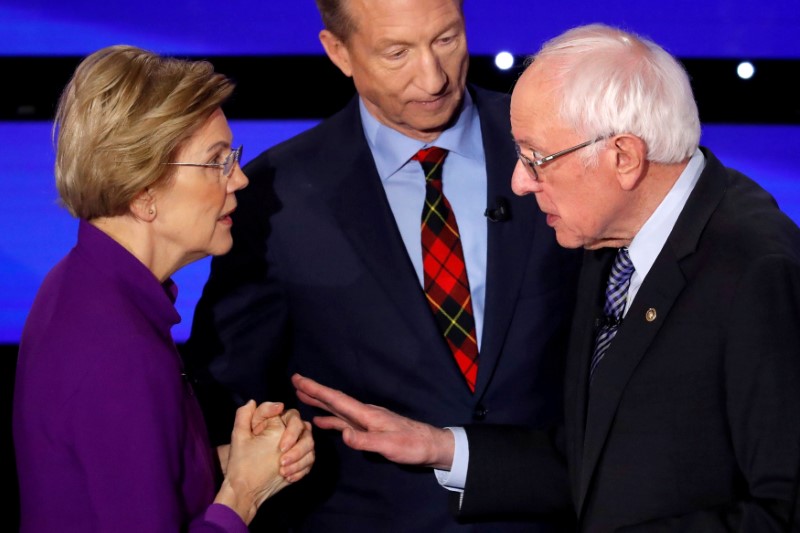By April Joyner
NEW YORK (Reuters) - Traders are less worried about political uncertainty in the run-up to the U.S. presidential election, with former Vice President Joe Biden remaining strong in the polls while Senator Elizabeth Warren has lost ground.
Implied volatility, which measures expectations for outsized equity price moves, has fallen significantly in the past few months for healthcare, financials and energy - sectors considered at risk of disruption or increased regulation under a Democratic president.
The decline in expectations for volatility tracks the poll numbers for Warren, who is considered to be among the most left-leaning Democratic candidates. Warren's standing peaked in October, according to Reuters/Ipsos polling, and has trailed off since then.
"We were seeing a lot more volatility in September, October, November, when the odds of Elizabeth Warren getting elected were higher," said Chris Murphy, co-head of derivative strategy at Susquehanna Financial Group. "Joe Biden seems to be the market's safe candidate."
Even a boost for Senator Bernie Sanders, another progressive candidate, has had little effect on implied volatility as Biden, seen as a moderate, has maintained a position at or near the lead in several polls.
GRAPHIC - Warren drops, volatility sinks: https://fingfx.thomsonreuters.com/gfx/mkt/13/1069/1060/Pasted%20Image.jpg
For instance, 30-day implied volatility for the Health Care Select Sector SPDR Fund (P:XLV) has dropped to 12.2% as of Wednesday morning, from 18.9% in early October, according to data from options analytics firm Trade Alert.
"So much of the Iowa anxiety was coming at a time when Warren was trending higher," said Michael Purves, founder of Tallbacken Capital Advisors in New York, in reference to the Iowa caucuses, the first presidential nominating contest, on Feb. 3. "That anxiety has dissipated."
Jitters related to the Democratic presidential primaries have not entirely disappeared. CBOE Volatility Index (VIX) futures expiring in late February show a bump in expectations for volatility. The futures reflect the outlook for the month-long period following that date, which encompasses Super Tuesday on March 3, when several key states, including California and Texas, hold primaries.
Still, "I would expect us to be seeing a lot more Super Tuesday positioning if there was some," Murphy said.
GRAPHIC - Positioning for U.S. election volatility: https://fingfx.thomsonreuters.com/gfx/mkt/13/1074/1065/Pasted%20Image.jpg
Options markets may reflect greater anticipation of risk around the U.S. presidential election in November.
Both VIX futures and the benchmark S&P 500 U.S. stock index (SPX) show a significant bump in implied volatility near the Nov. 3 vote, compared to either the preceding or following periods.

"Traders have already started pricing in a hefty election risk premium" around November, wrote Mandy Xu, equity derivatives strategist at Credit Suisse (SIX:CSGN) in New York, in a research note on Monday.